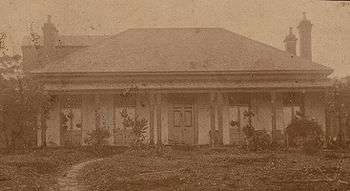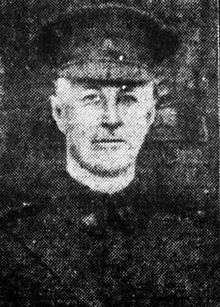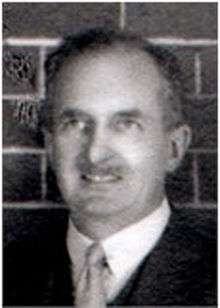The Hermitage, Ryde

The Hermitage in Denistone, Sydney, is an Australian colonial house of the Victorian era. It is listed by the New South Wales Heritage Council as a place of historical significance.[1] It was built between 1838 and 1842 by John Blaxland who was a member of a prominent Australian family.
John and Ellen Blaxland
.jpg)
John Blaxland was born in 1799 in Kent, England. His father was Gregory Blaxland, the famous explorer who conducted expeditions into the interior of New South Wales. His mother was Elizabeth Spurdon.[2] John’s family immigrated to Australia in 1805 and his father Gregory bought land in Ryde and built Brush Farm which still exists and is also a heritage building.[3]
In 1845 John married Ellen Falkner. Ellen was born in 1818 and was the daughter of Francis Henry Falkner of Bath in England who owned a successful wine business and was a member of the Town Council.[4] Her mother was Sarah Stringer. John and Ellen Blaxland had six sons and three daughters all of whom were born at the Hermitage. Unfortunately two of their daughters Edith and Florence who were twins died in 1857 at the age of two within a week of each other.[5]
John Blaxland held several important positions during his life. He was a merchant of independent means. For some years he was the Director of the Australian Joint Stock Bank and also the Auditor of the City Bank. In 1863 he became a Member of the New South Wales Legislative Council and held this position for over 20 years.[6] He was a strong advocate for the erection of the Parramatta and Iron Cove bridges[7]
Some of John’s children obtained prominent positions in the community. Frederick Blaxland qualified for the Bar in 1870 and became the senior partner in the legal firm Messrs Blaxland Mawson and Rose in Cooma. He was also for some years, the Mayor of Cooma.[8] Herbert Blaxland became a doctor and was appointed Medical Superintendent of the Gladesville Hospital.[9]
During their lives John and Ellen had a strong association with St Anne’s Church, Ryde (see photograph below) and today there still exists a Communion table in the Church with the following inscription.
- “To the glory of God and in memory of John Blaxland and Ellen his wife (née Falkner), of the Hermitage, Ryde.”[10]
John died in 1884 and Ellen continued to live at the Hermitage for three more years. An advertisement appeared in the Sydney Morning Herald in 1887 for the sale of the furniture at the Hermitage by order of “Mrs Blaxland" (see picture below).[11] At that time her only daughter Lucy married Sydney Levick[12] and Ellen went to live with her. She died in 1903 at the age of 85 at her daughter’s house. An obituary appeared in the Sydney Morning Herald at the time of her death outlining some details of her life and noting that she was “an old and respected resident of Ryde where she lived for over 40 years".[13] In 1905 The Hermitage was subdivided and put on the market. A large advertisement was put in the newspaper giving a colourful description of the property.[14] Professor James Pollock bought the house in 1910.
-

The Hermitage, Ryde (side of the house) circa 1872 at the time that the Blaxland family were in residence.
-

Advertisement in the Sydney Morning Herald in 1887 for the sale of furniture from the Hermitage placed by Ellen Blaxland.
-

St Anne's Church and surrounding area in Ryde in 1863 at the time the Blaxland family lived at the Hermitage.
Professor James Pollock

James Arthur Pollock was born in 1865 in county Cork in Ireland. His father was James Wheeler Pollock who was a damask manufacturer and his mother was Emma Brierley. He had one brother and one sister whose names were Hugh and Annie. He obtained a Bachelor of Engineering Degree from the Royal University of Ireland in 1884. However, in 1885, because of a decline in the family business, he migrated to Sydney and his family followed later.[15]
He obtained a job in as an astronomical assistant and in 1889 gained a Bachelor of Science Degree from the University of Sydney and won the University Medal. He was employed by the University in the Physics area and ten years later became a Professor at the age of 34. He never married.
In 1910 he bought The Hermitage and lived there with his unmarried sister Annie[16] until his death in 1922. In 1916, at the age of 51, James enlisted to fight in World War 1. He served in France in the Mining Corps and trained tunnellers to use equipment that he had helped to design. After the war he returned to his work at the University.[17]
Shortly after his return he advertised the sale of The Hermitage stating that the house was too large for him. The description of the property was:
- “Situated on the heights and commanding glorious panoramic views taking in Parramatta River and other features right on to the Western Mountains. The bungalow residence stands in its own grounds of two and three quarter acres, the latter laid out in lawn, garden and orchard. The residence is most substantially built of brick on stone foundations, slate roof. Contains 3 reception rooms, 7 bedrooms, 3 bathrooms, kitchen and laundry. All modern conveniences, 250 feet verandahs. Detached garage, man’s room and fowl houses.” [18]
James died in 1922. Annie was his sole beneficiary,[19] and after The Hermitage was sold she moved to another house in Sydney. She died thirty years later in 1952 and left her estate of about 40 thousand pounds to the University of Sydney to promote research in Physics and for the memory of her brother James.[20]
The Nicholson Family

Theo Nicholson (full name David Theodore Field Nicholson) was born in 1894 in Waverley, Sydney. His father was James Beath Nicholson and his mother was Ethel Catherine Beath. His father James had migrated from Scotland in 1885 and had helped to established and later owned the Standard-Waygood Company which was a large engineering firm. Theo went to work in his father’s engineering business and later took over the management of the company.[21]
In 1920 Theo married Elinor Young (full name Winifred Elinor Broughton Young) who was born in 1896 in Bundaberg Queensland. Her father was Horace Edward Broughton Young and her mother was Ellen Elizabeth Thorne.[22] The Young family owned a property called Fairymead Sugar Plantation near Bundaberg.[23] Elinor met Theo when her family came to Sydney for holidays to escape the heat. Both the Nicholson and Young families were very religious and were strongly involved in Christianity.[24]
In 1923 Theo and Elinor bought The Hermitage and lived there until 1952. Five of their six children were born there. One of their daughters Elinor Catherine (married name Dr Catherine Hamlin) became famous for her work in obstetrics and gynaecology to women in Ethiopia. She was awarded the Order of Australia (AC) for this work.[25] She has written a book about her life in which she gives some colourful details of her childhood at The Hermitage.[26] She says
- “When I was a child the house seemed huge with endless rooms and a big attic in which we could crawl about and play with all the old junk that had accumulated over the years. There were eight bedrooms. The upstairs attic rooms were rather poky, but my father had gable windows put in and then we had a beautiful view all the way down to the Parramatta River. Downstairs the rooms were wood panelled and there were wide verandahs in the front and back of the house. The garden was my mother’s special interest and delight. It was beautiful and, to me the most perfect garden I have ever been in.”.[27]
Her brother Peter Nicholson also gave an account of his childhood at the house called “The Hermitage: Memories of the 1930s.[28] He said that the property had orchards and vegetable gardens and that the family kept hens for eggs and had a cow that was milked.
Subsequent Owners
In 1952 the CSIRO bought The Hermitage and made major alterations and additions. They occupied the property until 1996. Today the property is being fully restored. The hermitage was purchased as a family home in 2012.
References
- ↑ New South Wales Heritage Council, Hermitage and Garden, Online reference http://www.heritage.nsw.gov.au/07_subnav_01_2.cfm?itemid=5045683
- ↑ Parliament of New South Wales, Former Members Archive
- ↑ Conway J., 1966 'Blaxland, Gregory (1778 - 1853)', Australian Dictionary of Biography, Volume 1, Melbourne University Press, pp 115-117.
- ↑ “The Gentlemen’s Magazine” July-Dec 1866, Vol 221, pp. 556-7.
- ↑ Sydney Morning Herald, 19 December 1857, p. 1.
- ↑ Parliament of New South Wales, Former Members Archive.
- ↑ The Argus (Melbourne) 29 January 1884, p. 5.
- ↑ Sydney Morning Herald, 6 September 1933, p. 17.
- ↑ Sydney Morning Herald, 13 April 1904, p. 10.
- ↑ Sydney Morning Herald, 1 May 1926, p. 8.
- ↑ Sydney Morning Herald, 7 May 1887, p. 16.
- ↑ New South Wales Births Deaths and Marriages
- ↑ Sydney Morning Herald, 16 October 1903, p. 5.
- ↑ Sydney Morning Herald, 15 November 1905, p. 15.
- ↑ McCaughan, J. 1988 “Pollock, James Arthur (1865-1922)”, Australian Dictionary of Biography, Vol 11, Melbourne University Press, pp. 253-4.
- ↑ James Pollock’s war records and subsequent letters show that Annie also resided at The Hermitage
- ↑ McCaughan, J. 1988 “Pollock, James Arthur (1865-1922)”, Australian Dictionary of Biography, Vol 11, Melbourne University Press, pp. 253-4
- ↑ Sydney Morning Herald, 4 September 1920, p. 16.
- ↑ Letter with James Pollock’s war records
- ↑ Sydney Morning Herald, 19 November 1952, p. 7
- ↑ Hamlin, C. 2001 “The Hospital by the River: a Story of Hope”, Pan McMillan Australia, Sydney, p. 15.
- ↑ New South Wales Births Deaths and Marriages.
- ↑ Hamlin, C. 2001, p. 12
- ↑ Hamlin C. 2001, p. 15.
- ↑ Australian Government, “It’s An Honour” Online reference http://www.itsanhonour.gov.au/honours/honour_roll/search.cfm?aus_award_id=883270&search_type=quick&showInd=true
- ↑ Hamlin, C. 2001 “The Hospital by the River: a Story of Hope”, Pan McMillan Australia, Sydney
- ↑ Hamlin C. 2001, p. 23.
- ↑ Curby, P. 1998 “The Hermitage: Memories of the 1930s” Ryde City Council
Coordinates: 33°48′06″S 151°05′57″E / 33.8016°S 151.0992°E